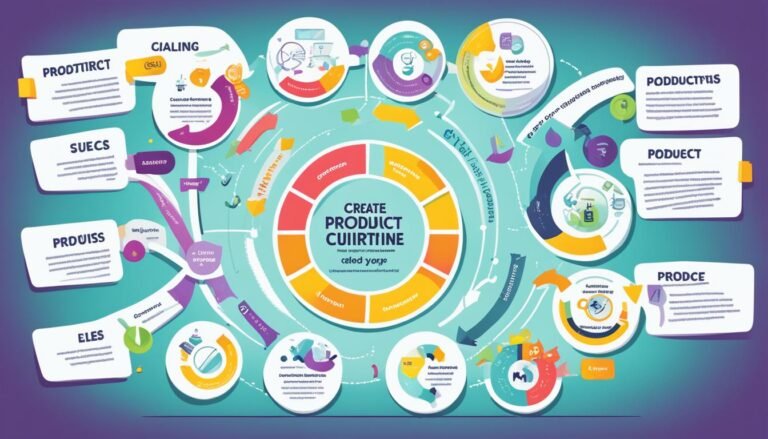Authority: Leveraging Credibility and Expertise
Did you know 92% of consumers trust advice from experts more than brand messages? In today’s world, where info is easy to find, being credible and an expert can set you apart. Building authority helps you shape customer choices and build a strong expert reputation.
Being an authority means having expertise, credibility, and trust. These are key for making smart choices. When you show you know your stuff and are reliable, you become a go-to source. This builds trust and helps your business grow and maintain a good name.
Key Takeaways
- Creating content is key to showing your expertise and teaching your audience.
- Building a personal brand helps build trust and credibility.
- Working with influencers can boost your authority.
- The authority principle is a key idea from Robert Cialdini’s six principles of persuasion.
- Using digital badges can show your authority online.
- Using the authority principle ethically keeps trust and credibility with users.
The Power of Authority Marketing
In today’s competitive world, businesses need to stand out to keep customers. Using an authority marketing strategy is a great way to do this. It means being seen as a leader in your field by sharing your knowledge and building trust.
Understanding Authority Marketing
Authority marketing is a plan to become a leader in your field. It means making and sharing valuable content, speaking at events, and doing PR to be seen as an expert. The aim is to be the go-to source for info and solutions in your area. This builds trust and influence with your audience.
Benefits of Establishing Authority
Having a strong authority marketing strategy brings big benefits:
- Competitive Differentiation: People prefer products from brands they see as experts.
- Enhanced Trust: Being seen as an authority builds trust with your audience, leading to loyalty.
- Increased Visibility: Authority gets you noticed, making you more visible in your industry.
- Lead Generation: Brands seen as authorities often get more leads and higher conversion rates.
- Loyal Advocacy: Happy customers will promote your brand, helping you grow even more.
Steps to Effective Authority Marketing
To make an authority marketing strategy work, follow these steps:
- Identifying Your Target Market: Know who you want to reach and make sure your content meets their needs.
- Creating Valuable Content: Make content that solves problems and shows off your knowledge.
- Constructing a Personal Brand: Create a personal brand that reflects your values and what makes you unique.
- Networking with Influencers: Connect with influencers to spread your message wider.
- Monetizing Expertise: Use your authority to offer premium products or services, strengthening your position and income.
The Importance of Establishing Authority
In today’s market, being an expert is key. People trust those with deep knowledge and skills. This trust gives them a big competitive edge.
Experts are more trusted than ads, with 94% of consumers following their advice. This shows how crucial it is to build trust with your audience.
Business leaders have a big impact, with 65% of employees looking up to them. But, having a strong relationship with someone also matters a lot, with 80% trusting advice from close friends. Being seen as an authority means your advice is trusted, giving you a strong voice in your field.
Showing you’re a thought leader is also key. About 75% of consumers use expert content to decide what to buy. Good communication skills can make you seem more like a leader, boosting your influence by 40%.
Trust, influence, and expertise together create a strong force for success. Working with influencers can increase conversions by 70% and brand awareness by 85%. Leadership also boosts team performance by 56%, showing the wide-ranging benefits of being an authority.
In short, building trust and being seen as an authority is vital in today’s market. Being a thought leader and showing your knowledge builds trust and strong relationships. This leads to lasting success and influence in your industry.
Building Your Personal Brand as an Expert
In today’s world, personal branding is key for professionals to stand out. Creating an authentic online identity by focusing on a specific area can boost your expert status.
Defining Your Niche and Target Audience
Finding your niche is the first step in personal branding. Studies show that having a clear target audience can increase engagement by 30%. Look at industry trends and match your niche with your interests to draw in a loyal crowd.
Creating a Compelling Value Proposition
A strong value proposition is vital for credibility. Research shows that 85% of successful personal brands highlight their unique value. Make a statement that clearly shows your skills and what makes you special to your audience.
Developing a Consistent and Authentic Voice
Keeping a consistent and authentic online identity on all platforms is crucial. Those who do see a 35% boost in trust and engagement from their audience. Being consistent in what you say helps build a trustworthy and likable brand.
Building Your Online Presence
A strong online presence shows off your skills and makes you more visible. This includes a professional website, active social media, and sharing valuable content. Sharing content regularly can lead to a 40% increase in audience engagement.
Establishing Credibility through Thought Leadership
Thought leadership is key to gaining trust and respect. It helps professionals stand out as experts in their field. By creating top-notch content, speaking at events, and using public relations, they become known as trusted voices.
Creating High-Quality Content
Making insightful content is crucial for thought leadership. Many B2B decision-makers look for articles to guide their choices. In fact, 47% find brands through such content.
It’s important to make content that grabs attention and offers useful tips. If a piece doesn’t catch someone’s interest in 60 seconds, 55% will move on. So, it’s key to keep publishing well-researched articles and studies to keep people interested and build trust.
Speaking at Industry Events
Speaking at events is another great way to show off your expertise. When you share your knowledge at conferences and webinars, you reach more people. You also become a leading voice in your field.
These events let you show off your deep knowledge and fresh ideas. You can also connect with others, which is important for building a strong reputation.
Engaging in Public Relations
Public relations are vital for sharing your achievements with more people. By using PR well, thought leaders can show off their successes and contributions. This builds trust and makes them seem like credible experts.
Using social media to connect with people also helps build lasting relationships. Brands like Salesforce use a thought leadership platform to share valuable content. This boosts their credibility and influence.
Leveraging Social Proof to Boost Your Authority
Social proof is a key way to show you’re an expert. By sharing testimonials, endorsements, and working with well-known groups, you boost your authority. A study by Brightlocal shows 76% of people check reviews online before buying something. This shows how important social proof is in making decisions.
Reviews build trust, as Referral Rock found 70% trust online reviews, even if they’re anonymous. This trust helps your brand look credible. For instance, Apple quickly answers customer questions or reviews, making customers happier and more trustful.
Most online shoppers, 93.4%, look at customer reviews when choosing where to shop. This shows how crucial social proof is for authority. Companies like Chipotle use Instagram Live to share recipes, showing they’re open and quality-focused, boosting their domain authority.
Working with micro-influencers who know their audience well can really connect with them. Dollar Shave Club teamed up with smaller YouTube stars to use social proof well. Thompson and Morgan also got more reviews by running fun contests.
Looking at likes, shares, comments, and retweets on social media shows how well your social proof is working. This tells you what kind of social proof, like testimonials or influencer support, works best for you. Tools like Outgrow help make your content more interactive, which can also boost your social proof.
In the end, using social proof in different ways, like customer reviews, influencer partnerships, and social media, can really help your authority. By always working to build trust with honest and engaging content, you’ll become a top name in your field.
Creating Compelling Content that Showcases Your Expertise
Creating content that highlights your expertise is key to being seen as an authority in your field. Use blog posts, videos, webinars, and podcasts to share your knowledge. Knowing what your audience needs and wants helps you connect with them and show your expertise.
Blog Posts and Articles
High-quality blog posts and articles are great for expertise showcasing. They let you go deep into topics that matter to your industry. Make sure your content is well-researched, helpful, and addresses your audience’s problems. Using SEO, like Moz and HubSpot do, can help you reach more people.
Videos and Webinars
Videos and webinars are great for compelling content creation. They let you share information in a lively way and connect with your audience more deeply. You can do short videos or long webinars on tough topics. Webinars also let you talk to your audience live, building a stronger bond.
Podcasts and Interviews
Podcasts and interviews are great for sharing your knowledge and expertise. Being on podcasts lets you reach more people and share useful info easily. Being a guest on podcasts or interviewing experts in your field can make you look like a big name in your area.
Stick to three or four main topics to keep your message strong and clear. Use surveys, interviews, or online groups to make sure your content meets your audience’s needs.
Using Media and PR to Amplify Your Expertise
In today’s fast-paced digital world, using media and PR is key for brands to grow. These tools help professionals and businesses stand out and gain trust. They make a big difference in how well-known and respected a brand is.
Effective media coverage gives a brand a wider reach. For example, healthcare companies saw a 30% increase in industry recognition thanks to PR and media. The fashion industry also saw a 45% jump in social media engagement after working with influencers.
Public perception is very powerful. A survey found that 70% of people trust a brand more after reading a positive article. This shows how important media coverage is in shaping what people think of a brand.
Good PR strategies can boost sales and growth. For tech startups, media coverage led to a 25% increase in sales. Food and beverage companies saw a 40% rise in website traffic after media coverage. PR also helped tech startups grow their brand awareness by 20%.
Effective media and PR strategies include several tactics:
- Building strong media relationships to amplify brand presence.
- Offering exclusive content to journalists for deeper and more favorable coverage.
- Hosting media events to foster direct connections with journalists.
- Following up post-coverage to sustain positive relationships.
By using these methods, businesses can make the most of media and PR. For example, media partnerships led to a 35% increase in event attendance in the entertainment industry. PR tactics also helped retail companies increase customer loyalty by 50%.
Public relations strategies are also key in handling risks and crises. Skilled publicists help brands navigate tough times by using their media connections and knowledge. They work to keep the brand in a good light.
In conclusion, using media coverage and strategic PR is vital for any business looking to grow and become a leader. By adopting these strategies, companies can improve their reputation, reach more people, and become go-to voices in their industries.
Harnessing the Influence of Influencers in Your Niche
Working with influencers can really boost your brand in your niche. By connecting with influencers who share your values, you can use their influence to grow your brand. This approach helps make your brand a leader in your field.
Identifying Key Influencers
Start by finding influencers that match your brand and speak to your audience. Tools like BuzzSumo, HypeAuditor, and Traackr help you see who has the best reach and audience. It’s important to pick influencers of all sizes, from nano to mega, for the best results. Micro-influencers, with 10,000 to 100,000 followers, often have higher engagement rates because they connect deeply with their followers.
Building Relationships with Influencers
After finding the right influencers, it’s time to build relationships. Be real with them, like their posts, share things that match your brand, and keep talking. Real connections can lead to big wins for your brand. When influencers truly support your brand, it makes your brand more credible in your niche.
Collaborative Marketing Strategies
Working together with influencers is key. Try new things like making content together, hosting events, or running special campaigns. For example, Glossier worked with micro-influencers on Instagram and saw big sales and brand awareness boosts. Being clear about sponsored content and setting shared goals keeps customers trusting you and follows the law.
In the end, using influencers right can really lift your brand’s influence in your niche. It’s a smart way to advertise that can bring a strong return on investment. This approach can lead to long-term success for your brand.
Converting Authority into Business Success
Turning your authority into business growth means using your credibility and expertise wisely. The knowledge and reputation you’ve built can help you influence the market and gain customer trust. This leads to more sales and steady profits.
Using storytelling is a key way to make your authority work for your business. Research shows that stories can make people trust and feel closer to you, which is key for building trust. Also, 73% of people say a good story helps them decide what to buy, showing how important it is to tell engaging stories.
Sharing top-quality content is also vital. Companies with a clear purpose grow faster than others. Sharing your mission and vision can deeply affect your influence in the market. Plus, making marketing personal can increase sales by up to 15%, showing the power of connecting with people.
Being generous in your marketing can also boost your authority. Giving away valuable content can make people more likely to buy more from you. George Loewenstein’s theory on bundling shows that offering free stuff with paid services makes buying easier, helping your business grow.
Lastly, being a trusted source in your field can greatly increase your influence. A survey found that 93% of people trust content from influencers. Keeping your promises and supporting your customers can keep them coming back, leading to strong business success based on your authority.
Continuous Learning and Professional Development
In today’s fast-paced business world, learning and growing professionally is key. Over 40% of employees with poor training leave within a year. This shows how important ongoing learning is. It boosts job performance and helps people adjust to new market changes, leading to long-term growth.
Staying Updated with Industry Trends
It’s vital to keep up with industry trends to stay relevant. New tech like VR, AR, and AI is changing how we learn. Social learning platforms and short sessions make it easy to stay informed and competitive. Lifelong learning is now seen as vital for personal and career growth.
Participating in Professional Training
Structured training is key for moving up in your career. RiseUpp offers over 6,000 courses and personalized advice, meeting individual needs. Certifications from Coursera, LinkedIn Learning, and Udemy boost your skills and marketability. Plus, ongoing learning cuts down on turnover and recruitment costs, helping both employees and companies.
Networking with Other Experts
Professional growth is shaped by the connections you make in your field. Being active in networking at events and online keeps you updated on trends. Online groups and forums let you share knowledge with peers, creating a supportive learning space. Mentorship programs offer valuable insights and guidance, helping your career grow. Networking helps you grow your skills and boosts your leadership credibility.
Source Links
- Authority marketing: How to Establish and Leverage Your Expertise and Credibility to Attract and Persuade Your Target Market – FasterCapital
- The Authority Principle: Leveraging Expertise in Design
- What Is Authority Marketing: Why It Works and How to Use It
- What Is Authority Principle? | Role in Marketing & Business Strategy
- Using the “Voice of Authority” in Marketing // How to Leverage It to Elevate Your Brand Identity
- The Power of Influence: How to Leverage Your Influence for Success
- Authority: How to Establish and Leverage Your Authority in Your Niche – FasterCapital
- Leveraging AI: Trust and Authority in Digital Marketing
- Maven: How to Create and Leverage Your Personal Brand
- Building a Personal Brand Through Thought Leadership
- How to Build a Personal Brand: 11 Tips for Success | Markitors
- Build Trust and Authority Through Thought Leadership Marketing – Content Hacker
- The Impact of Thought Leadership Content on Brand Credibility
- Demonstrating Expertise and Credibility for Thought Leadership » { design@tive } information design
- Power of Influence: Leveraging Social Proof to Boost Engagement
- Leveraging Social Proof To Boost Your Authority – FasterCapital
- How to Create Authority Content (11-Step Guide For Building Your Expert Brand) – Samantha North
- How do you leverage your niche expertise and authority to build trust and loyalty?
- No title found
- Expert PR Strategies for Building Relationships with the Media
- Leveraging Media And Pr To Amplify Your Expertise – FasterCapital
- The Power of Influencer Marketing: Leveraging Authentic Connections for Business Success
- Harnessing the Power of Influencer Marketing
- 14 Steps to Establish your Business as an Authority in your Field – mastensolutions.com
- Author=Authority: The Equation for Business Success
- Authority: How to Use Authority to Establish Your Credibility and Expertise in Your Marketing Funnel – FasterCapital
- Top 12 Benefits of Continuous Learning and Development
- The Importance of Continuous Learning in the Modern Workplace
- Continuous Learning and Professional Development for Administrators







